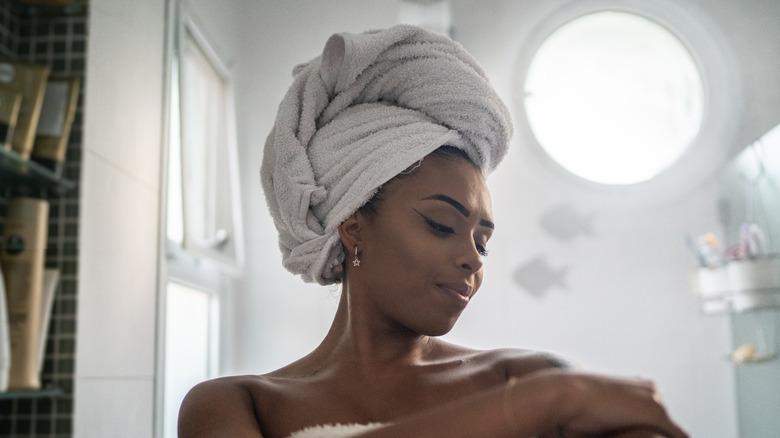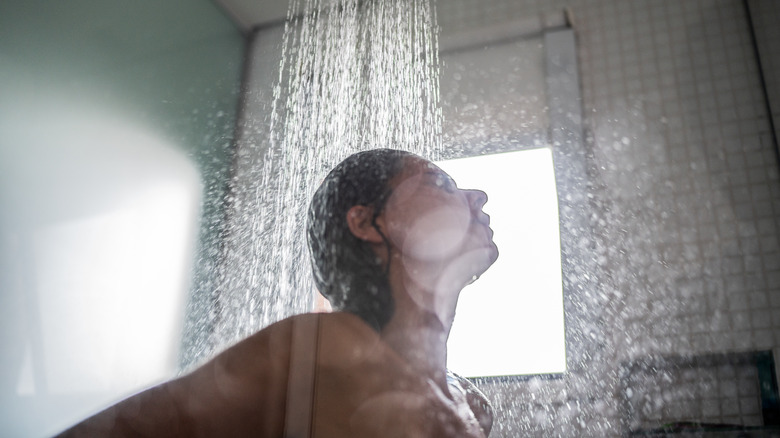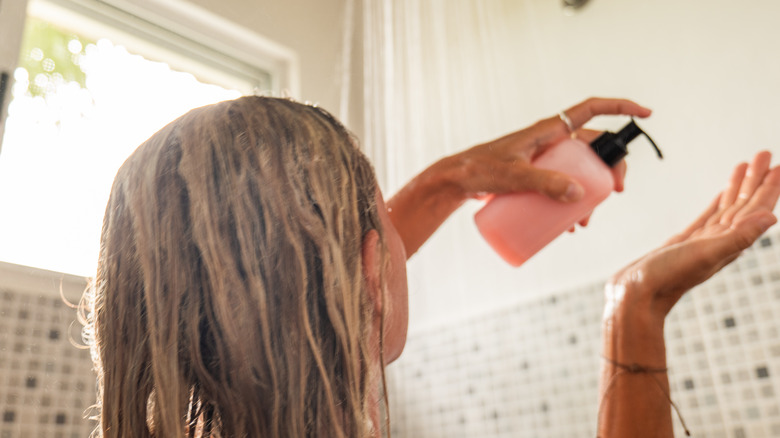The Way You Wash Your Hair May Be Doing More Damage Than You Think
Most of us have a hair-washing routine that we follow pretty consistently every time we jump in the shower. Perhaps it's what we were taught to do as kids or it's based on a YouTube video we saw in our 20s, but there's a step-by-step process we follow, almost habitually.
However, you might be washing your hair completely wrong. Did you know that the way you wash your locks could be causing damage to your scalp and hair strands? Per experts, one of the fundamental mistakes you can make is to use your fingernails to cleanse your scalp. You know what we're talking about. You've had a particularly long day or you've not washed your hair in a few days, and you can almost feel the ick on your scalp when you step in the shower. All you want to do is scrub away all the impurities, so you scratch away at your scalp. This can irritate your scalp and also cause flaking, shared dermatologist Dr. Sandy Johnson (via The Healthy). It can also cause hair breakage.
"The best practice is to use the pads of your fingertips, and not your fingernails, to scrub your scalp," professional hairstylist Paul Wintner told Real Simple. "Using circular motions with slight pressure will be enough to cleanse the scalp and hair."
More ways hair washing can cause damage
When you're in a hurry to get out the door for an important appointment, you might be tempted to rush through a shower and this might result in you not properly wetting your hair before you shampoo it. It might also mean that you rush through the post-shampoo rinse, just so you can apply conditioner and be done with it all. Both of these could lead to hair damage, per hair experts.
Making sure that your scalp and your hair strands are properly soaked is an important step in the hair-washing process, according to master cosmetologist Cassandra Olivia (via Byrdie). "Stand under the shower for a minute or two and section [your] hair to ensure water gets to all parts of your scalp and hair," she explained. If you're wondering about double-cleansing your locks, dermatologists recommend this only if you're washing your hair once or twice a week. If you shower daily, this practice might dry out your scalp.
Now for the rinsing process. Again, it's important to take your time and make sure you've washed out all the shampoo. Or else, product buildup is going to lead to clogged pores and an irritated or itchy scalp. "I find most people don't rinse their shampoo and conditioner out properly and are left with product build-up. If you think you've rinsed enough, keep rinsing," shared colorist Cara Craig with TODAY.
How long you should be in the shower
All this concern about mindfully washing your scalp and tresses might make you feel like your shower time should be increased; but that's not necessarily true, say the experts. In fact, keeping your showers to under 10 minutes is a good practice to follow.
Too much hair washing or too long showers can dry out your skin and scalp. Board-certified dermatologist Dr. Lucy Chen told Brightly that while how much you shower and how often would depend on your lifestyle, it's never a good idea to go overboard. "You can dry out your hair by stripping it of natural oils, dry out your skin, and also can develop contact and seborrheic dermatitis," offered Dr. Chen.
There is also the question of whether washing your hair every day could damage your tresses. A lot of things like your hair type, age, whether or not it's been chemically treated, and your lifestyle come into play here. However, once or twice per week is a good general rule for normal hair, per the assistant attending dermatologist at Memorial Sloan Kettering Cancer Center in New York City, Dr. Anthony Rossi (via CNN). But, again, it's hard to give a one-size-fits-all recommendation. Also, if you're a fan of tilting your head and trying the upside-down hair-washing technique, there are benefits to this method too, like a deeper clean and more volume post-hair wash. The important thing to remember is to understand your own particular hair type and what it needs when it comes to hair washing and hair care products.



